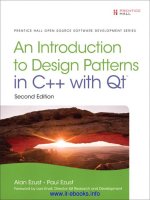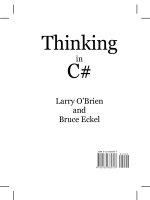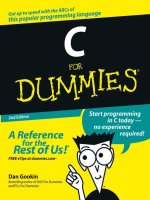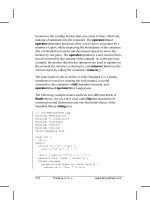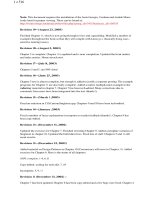Thinking in C++, Volume 1, 2nd Edition ppt
Bạn đang xem bản rút gọn của tài liệu. Xem và tải ngay bản đầy đủ của tài liệu tại đây (2.69 MB, 878 trang )
Thinking in C++,
Volume 1, 2nd Edition
Completed January 13, 2000
Bruce Eckel, President,
MindView, Inc.
Planet PDF brings you the Portable Document
Format (PDF) version of Thinking in C++ Volume 1
(2
nd
Edition). Planet PDF is the premier PDF-
related site on the web. There is news, software,
white papers, interviews, product reviews, Web
links, code samples, a forum, and regular articles
by many of the most prominent and respected PDF
experts in the world. Visit our sites for more detail:
/>
/>
/>
/>
Click here to buy the paper version
Winner, Software Development Magazine’s
1996 Jolt Award for Best Book of the Year
“This book is a tremendous achievement. You owe it to yourself to
have a copy on your shelf. The chapter on iostreams is the most
comprehensive and understandable treatment of that subject I’ve
seen to date.”
Al Stevens
Contributing Editor, Doctor Dobbs Journal
“Eckel’s book is the only one to so clearly explain how to rethink
program construction for object orientation. That the book is also
an excellent tutorial on the ins and outs of C++ is an added bonus.”
Andrew Binstock
Editor, Unix Review
“Bruce continues to amaze me with his insight into C++, and
Thinking in C++
is his best collection of ideas yet. If you want clear
answers to difficult questions about C++, buy this outstanding
book.”
Gary Entsminger
Author, The Tao of Objects
“
Thinking in C++
patiently and methodically explores the issues of
when and how to use inlines, references, operator overloading,
inheritance and dynamic objects, as well as advanced topics such as
the proper use of templates, exceptions and multiple inheritance.
The entire effort is woven in a fabric that includes Eckel’s own
philosophy of object and program design. A must for every C++
developer’s bookshelf,
Thinking in C++
is the one C++ book you
must have if you’re doing serious development with C++.”
Richard Hale Shaw
Contributing Editor, PC Magazine
Comments from Readers:
Wonderful book … Great stuff!
Andrew Schulman, Doctor Dobbs Journal
An absolute, unqualified must. One of the most-used, most trusted books on my
shelf.”
TUG Lines
This is stuff a programmer can really use.
IEEE Computer
A refreshing departure.
PJ Plauger,
Embedded Systems Programming
magazine
…Eckel succeeds … it’s so readable
. Unix World
Should definitely be your first buy.
C Gazette
A fantastic reference for C++!
Michael Brandt, Senior Analyst/Programmer,
Sydney, Australia
On our project at HRB Systems we call your book “The Answer Book”. It is our
C++ Bible for the project.
Curt Snyder, HRB Systems
Your book is really great, and I can’t thank you enough for making it available
for free on the web. It’s one of the most thorough and useful references for C++
I’ve seen.
Russell Davis
the only book out there that even comes close to being actually readable when
trying to learn the ropes of C++ (and the basics of good object oriented
programming in general).
Gunther Schulz, KawaiiSoft
I love the examples in your book. There’s stuff there that I never would have
thought of (and some things that I didn’t know you could do)!
Rich Herrick,
Senior Associate Software Engineer, Lockheed-Martin Federal Systems,
Owego, NY
It’s an amazing book. Any questions I have I refer to this online book. Helped in
every case. I’m simply happy to have access to a book of this caliber.
Wes Kells,
Comp Eng. Student, SLC Kingston.
You are an invaluable resource and I greatly appreciate your books, email list
etc It seems every project I have worked on has been successful because of your
insights.
Justin Voshell
This is the book I have been looking for on C++.
Thomas A. Fink, Managing
Director, Trepp, LLC
Your books are authoritative yet easy to read. To my colleagues I call you the
K&R of C++
. Mark Orlassino, Senior Design Engineer, Harmon
Industries, Inc., Hauppauge, NY
When I first started learning C++, your book “Thinking in C++” was my shining
guide light in a dark tunnel. It has been my endeavor to improve my C++ skills
whenever possible, and to that effect, “Thinking in C++” has given me the strong
foundation for my continuous improvement.
Peter Tran, Senior Systems
Analyst (IM), Compaq Computer Corporation
This book is the best general reference in my on-going quest to master C++. Most
books explain some topics thoroughly but are deficient in others. “Thinking in
C++” 2/E does not pass the buck to another book. When I have questions it has
answers.
Thomas Michel
I have a whole mountain of books and none of them make sense nor do they
explain things properly. I have been dying for a good template and STL book.
Then I decided to read your material and I was amazed. What you did was show
how to write C++ with templates and STL without bogging down with details.
What you did was what I expected of the C++ community, the next generation of
C++ authors. As an author I AM IMPRESSED at your writing and explanation
skills. You covered topics that nobody has properly covered before. Your
approach is one from a person who has actually sat down and went through the
material in detail. And then you questioned the sanity of the situation and what
would be the problem areas. On my bookshelf, it will definitely be one of the
necessary books, right beside Petzold.
Christian Gross, consultant/mentor
I think your book is very, very, VERY good. I have compared it to others in the
bookstore, and have found that your book actually teaches me basic C++
fundamentals while I learn the STL a very nice experience to learn about both
at once, hand-in-hand. I think your book is laid out very well, and explains
things in an easy-to-understand fashion.
Jeff Meininger, Software Developer,
boxybutgood.com
Your book is the best by far of any I’ve seen. Please get it right so that we can all
have an excellent and “reliable” reference work! And please hurry! We are
desperate for a work of this quality!
Steve Strickland, Live Minds (a Puzzle
business)
(On Usenet) Unlike most other C++ authors, Eckel has made a career of teaching
C++ and Java classes ONLY. He’s had the benefit of a GREAT deal of novice
feedback, and the books reflect that. His books are not just about writing in
C++/Java, but understanding the intent of the languages and the mindset that
goes with thinking in them. Eckel’s also the best technical writer I’ve read since
Jeff Duntemann. Very clear and easy to read. Don’t be put off by the apparent
large size of his books. Either can be read in *less* than 21 days. :-}
Randy
Crawford, MRJ Technology Solutions, Fairfax VA
Your work is greatly appreciated and I thank you for helping me understand
both C++ and Java better.
Barry Wallin, Math/Computer Science Teacher,
Rosemount High School, Rosemount, MN
I would like to thank you for your book “Thinking in C++” which is, with no
doubt, the best book I ever read about this subject.
Riccardo Tarli - SW
Engineer - R&D TXT Ingegneria Informatica - Italy
I have been reading both of your books, Thinking In Java and Thinking In C++.
Each of these books is easily the best in its category.
Ratnakarprasad H.
Tiwari, Mumbai, India
… the “Debugging Hints” section is so valuable, I’m tempted to print it and keep
it with me at all times. I think this section should be a mandatory part of any
introductory class after the first one or two programming problems.
Fred
Ballard, Synectics Inc.
Your book is really a treasure trove of C++ knowledge. I feel like you give a good
overview and then explain the nuts and bolts.
Raymond Pickles, Antenna
Section, Radar Division, U.S. Naval Research Laboratory, Washington
DC
As an Internal Medicine Specialist and Computer Scientist I spend a great deal of
time trying to extract information from books and journals. My experience is that
a good author is one who makes difficult concepts accessible, a great one makes
it look almost easy. On this score you are certainly one of my top three technical
writers. Keep up the good work.
Dr. Declan O’Kane, Leicester, England
For my second-level C++ course, “Thinking in C++” is my constant reference
and companion, and I urge my students to consult it regularly. I refer to the
chapter on Operator Overloading constantly. The examples/code alone are
worth the cost of the book many times over. So many books and development
environments are predicated on the assumption that the only application for a
programming language is for a Windows environment; it’s great to find and use
a book which concentrates on C++ so we can prepare our students for careers in
fields like embedded systems, networking, etc., which require real depth of
understanding.
Robert Chase, Professor, Sweet Briar College
I think it’s a fantastic intro to C++, especially for longtime dabblers like me – I
often know “how,” but rarely “why,” and TIC2 is a godsend.
Tony Likhite,
System Administrator/DBA, Together Networks
After reading the first 80 pages of this book, I have a better understanding of oop
then I've gotten out of the ton of books I've accumulated on the subject. Thanks
Rick Schneewind
Thinking
In
C++
Second Edition
Bruce Eckel
President, MindView Inc.
Prentice Hall
Upper Saddle River, New Jersey 07458
Publisher:
Alan Apt
Production Editor:
Scott Disanno
Executive Managing Editor:
Vince O'Brien
Vice President and Editorial Director:
Marcia Horton
Vice President of Production and Manufacturing:
David W. Riccardi
Project Manager:
Ana Terry
Book Design, Cover Design and Cover Line Art:
Daniel Will-Harris,
Cover Watercolor:
Bruce Eckel
Copy Editor:
Stephanie English
Production Coordinator:
Lori Bulwin
Editorial Assistant:
Toni Holm
Marketing Managers:
Jennie Burger, Bryan Gambrel
©2000 by Bruce Eckel, MindView, Inc.
Published by Prentice Hall Inc.
Pearson Higher Education
Upper Saddle River, New Jersey 07632
The information in this book is distributed on an “as is” basis, without warranty. While
every precaution has been taken in the preparation of this book, neither the author nor the
publisher shall have any liability to any person or entitle with respect to any liability, loss
or damage caused or alleged to be caused directly or indirectly by instructions contained
in this book or by the computer software or hardware products described herein.
All rights reserved. No part of this book may be reproduced in any form or by any
electronic or mechanical means including information storage and retrieval systems
without permission in writing from the publisher or author, except by a reviewer who
may quote brief passages in a review. Any of the names used in the examples and text of
this book are fictional; any relationship to persons living or dead or to fictional characters
in other works is purely coincidental.
Printed in the United States of America
10 9 8 7 6 5 4 3 2 1
ISBN 0-13-979809-9
Prentice-Hall International (UK) Limited,
London
Prentice-Hall of Australia Pty. Limited,
Sydney
Prentice-Hall Canada, Inc.,
Toronto
Prentice-Hall Hispanoamericana, S.A.,
Mexico
Prentice-Hall of India Private Limited,
New Delhi
Prentice-Hall of Japan, Inc.,
Tokyo
Pearson Education Asia Ltd.,
Singapore
Editora Prentice-Hall do Brasil, Ltda.,
Rio de Janeiro
Public
C++ Seminars
Check www.BruceEckel.com
for in-depth details and the date
and location of the next:
Hands-On C++ Seminar
•
Based on this book
•
Get a solid grounding in Standard C++ fundamentals
•
Includes in-class programming exercises
•
Personal attention during exercises
Intermediate C++ Seminar
•
Based on Volume 2 of this book (downloadable at
www.BruceEckel.com)
•
In-depth coverage of the Standard C++ Library
•
Strings, containers, iterators, algorithms
•
In-depth templates & exception handling
Advanced C++ Topics
•
Based on advanced topics in Volume 2 of this book
•
Design patterns
•
Building robust systems
•
Creating testing & debugging frameworks
Subscribe to the free newsletter
to be automatically informed
of upcoming seminars
Also visit www.BrucEckel.com for:
!"Consulting Services
!"
Exercise solutions for this book
Seminars-on-CD-ROM
If you like the
Thinking in C
Seminar-on-CD packaged with
this book, then you’ll also like:
Bruce Eckel’s
Hands-On C++ Seminar
Multimedia CD ROM
It’s like coming to the seminar!
Available at www.BruceEckel.com
•
Overhead slides and synchronized audio recorded by Bruce Eckel
•
All the lectures from the Hands-On C++ Seminar
•
Based on this book
•
Get a solid grounding in Standard C++ Fundamentals
•
Just play it to see and hear the lectures!
•
Lectures are indexed so you can rapidly locate the discussion
of any subject
•
Details and sample lecture can be found on the Web site
See www.BruceEckel.com
for other Seminars-on-CD ROM
•
The Intermediate C++ Seminar
•
Advanced C++ Topics
Dedication
To my parents, my sister, and my brother
What’s inside
Preface 1
What’s new in
the second edition 2
What’s in Volume 2
of this book 3
How to get Volume 2 3
Prerequisites 4
Learning C++ 4
Goals 6
Chapters 7
Exercises 13
Exercise solutions 13
Source code 13
Language
standards 15
Language support 16
The book’s
CD ROM 16
CD ROMs, seminars,
and consulting 17
Errors 17
About the cover 18
Book design and
production 19
Acknowledgements . 20
1: Introduction to
Objects 23
The progress of
abstraction 25
An object has an
interface 27
The hidden
implementation 30
Reusing the
implementation 32
Inheritance: reusing
the interface 34
Is-a vs. is-like-a
relationships 38
Interchangeable
objects with
polymorphism 40
Creating and
destroying objects 45
Exception handling:
dealing with errors 46
Analysis
and design 48
Phase 0: Make a plan 51
Phase 1: What are
we making? 52
Phase 2: How will
we build it? 56
Phase 3: Build the core 61
Phase 4: Iterate
the use cases 62
Phase 5: Evolution 63
Plans pay off 65
Extreme
programming 66
Write tests first 66
Pair programming 68
Why C++
succeeds 70
A better C 71
You’re already on
the learning curve 71
Efficiency 71
Systems are easier to
express and understand 72
Maximal leverage
with libraries 73
Source-code reuse
with templates 73
Error handling 73
Programming in the large 74
Strategies for
transition 74
Guidelines 75
Management obstacles 77
Summary 79
2: Making & Using
Objects 83
The process of
language
translation 84
Interpreters 85
Compilers 86
The compilation process 87
Tools for separate
compilation 89
Declarations vs. definitions 90
Linking 96
Using libraries 97
Your first
C++ program 99
Using the iostreams class 99
Namespaces 100
Fundamentals of
program structure 102
"Hello, world!" 103
Running the compiler 105
More about
iostreams 105
Character array
concatenation 106
Reading input 107
Calling other programs 107
Introducing
strings 108
Reading and
writing files 110
Introducing
vector 112
Summary 118
Exercises 119
3: The C in C++ 121
Creating
functions 122
Function return values 125
Using the C
function library 126
Creating your own
libraries with the librarian 127
Controlling
execution 128
True and false 128
if-else 128
while 130
do-while 131
for 131
The break and
continue keywords 132
switch 134
Using and misusing goto 136
Recursion 137
Introduction to
operators 138
Precedence 138
Auto increment
and decrement 139
Introduction to
data types 140
Basic built-in types 140
bool, true, & false 142
Specifiers 143
Introduction to pointers 145
Modifying the
outside object 149
Introduction to
C++ references 151
Pointers and references
as modifiers 153
Scoping 155
Defining variables
on the fly 156
Specifying storage
allocation 159
Global variables 159
Local variables 161
static 161
extern 163
Constants 165
volatile 167
Operators and
their use 168
Assignment 168
Mathematical operators 169
Relational operators 171
Logical operators 171
Bitwise operators 172
Shift operators 173
Unary operators 176
The ternary operator 177
The comma operator 178
Common pitfalls
when using operators 179
Casting operators 179
C++ explicit casts 181
sizeof – an operator
by itself 186
The asm keyword 187
Explicit operators 187
Composite type
creation 188
Aliasing names
with typedef 188
Combining variables
with struct 189
Clarifying programs
with enum 192
Saving memory
with union 195
Arrays 196
Debugging hints 208
Debugging flags 208
Turning variables and
expressions into strings 211
The C assert( ) macro 212
Function
addresses 213
Defining a
function pointer 213
Complicated declarations
& definitions 214
Using a function pointer 215
Arrays of pointers
to functions 216
Make: managing
separate
compilation 217
Make activities 219
Makefiles in this book 222
An example makefile 223
Summary 226
Exercises 226
4: Data Abstraction 233
A tiny C-like
library 235
Dynamic
storage allocation 239
Bad guesses 244
What's wrong? 246
The basic object 247
What's an object? 255
Abstract
data typing 256
Object details 257
Header file
etiquette 259
Importance of
header files 260
The multiple-declaration
problem 262
The preprocessor directives
#define, #ifdef,
and #endif 263
A standard for header files. 264
Namespaces in headers 265
Using headers in projects 266
Nested structures 266
Global scope resolution 271
Summary 271
Exercises 272
5: Hiding the
Implementation 277
Setting limits 278
C++ access
control 279
protected 281
Friends 281
Nested friends 284
Is it pure? 287
Object layout 288
The class 289
Modifying Stash to use
access control 292
Modifying Stack to use
access control 293
Handle classes 294
Hiding the
implementation 295
Reducing recompilation 295
Summary 298
Exercises 299
6: Initialization &
Cleanup 301
Guaranteed
initialization with the
constructor 303
Guaranteed cleanup
with the
destructor 305
Elimination of the
definition block 308
for loops 310
Storage allocation 311
Stash with
constructors and
destructors 313
Stack with constructors
& destructors 316
Aggregate
initialization 320
Default
constructors 323
Summary 324
Exercises 325
7: Function Overloading
& Default
Arguments 327
More name
decoration 329
Overloading on
return values 331
Type-safe linkage 331
Overloading
example 333
unions 336
Default
arguments 340
Placeholder arguments 342
Choosing overloading
vs. default
arguments 342
Summary 348
Exercises 349
8: Constants 353
Value substitution 354
const in header files 355
Safety consts 356
Aggregates 358
Differences with C 358
Pointers 360
Pointer to const 361
const pointer 362
Assignment and
type checking 363
Function arguments &
return values 364
Passing by const value 365
Returning by const value 366
Passing and returning
addresses 369
Classes 373
const in classes 374
Compile-time constants
in classes 377
const objects &
member functions 380
volatile 386
Summary 388
Exercises 388
9: Inline Functions 393
Preprocessor
pitfalls 394
Macros and access 398
Inline functions 399
Inlines inside classes 400
Access functions 401
Stash & Stack
with inlines 408
Inlines &
the compiler 412
Limitations 413
Forward references 414
Hidden activities in
constructors &
destructors 415
Reducing clutter 417
More preprocessor
features 418
Token pasting 419
Improved error
checking 420
Summary 423
Exercises 424
10: Name Control 427
Static elements
from C 428
static variables
inside functions 428
Controlling linkage 434
Other storage
class specifiers 436
Namespaces 437
Creating a namespace 437
Using a namespace 440
The use of namespaces 445
Static members
in C++ 446
Defining storage for
static data members 446
Nested and local classes 451
static member functions 452
Static initialization
dependency 455
What to do 457
Alternate linkage
specifications 465
Summary 466
Exercises 467
11: References & the
Copy-Constructor 473
Pointers in C++ 474
References
in C++ 475
References in functions 476
Argument-passing
guidelines 479
The copy-
constructor 479
Passing & returning
by value 480
Copy-construction 487
Default copy-constructor 493
Alternatives to copy-
construction 496
Pointers
to members 498
Functions 501
Summary 504
Exercises 505
12: Operator
Overloading 511
Warning &
reassurance 512
Syntax 513
Overloadable
operators 515
Unary operators 515
Binary operators 520
Arguments &
return values 531
Unusual operators 535
Operators you
can’t overload 544
Non-member
operators 545
Basic guidelines 547
Overloading
assignment 548
Behavior of operator= 549
Automatic type
conversion 561
Constructor conversion 561
Operator conversion 563
Type conversion example 566
Pitfalls in automatic
type conversion 567
Summary 570
Exercises 570
13: Dynamic
Object Creation 575
Object creation 577
C’s approach to the heap 578
operator new 580
operator delete 581
A simple example 581
Memory manager
overhead 582
Early examples
redesigned 583
delete void* is
probably a bug 584
Cleanup responsibility
with pointers 585
Stash for pointers 586
new & delete
for arrays 592
Making a pointer
more like an array 593
Running out
of storage 594
Overloading
new & delete 595
Overloading global
new & delete 597
Overloading
new & delete for a class 599
Overloading
new & delete for arrays 603
Constructor calls 605
placement new & delete 607
Summary 609
Exercises 610
14: Inheritance &
Composition 613
Composition
syntax 614
Inheritance
syntax 616
The constructor
initializer list 618
Member object
initialization 619
Built-in types in the
initializer list 620
Combining composition
& inheritance 621
Order of constructor &
destructor calls 623
Name hiding 625
Functions that
don’t automatically
inherit 630
Inheritance and static
member functions 635
Choosing composition
vs. inheritance 635
Subtyping 637
private inheritance 640
protected 641
protected inheritance 643
Operator overloading
& inheritance 643
Multiple
inheritance 645
Incremental
development 645
Upcasting 647
Why “upcasting?” 648
Upcasting and the
copy-constructor 649
Composition vs.
inheritance (revisited) 652
Pointer & reference
upcasting 653
A crisis 654
Summary 654
Exercises 655
15: Polymorphism &
Virtual Functions 659
Evolution of C++
programmers 660
Upcasting 662
The problem 663
Function call binding 663
virtual functions 664
Extensibility 666
How C++ implements
late binding 669
Storing type information 670
Picturing virtual functions 672
Under the hood 674
Installing the vpointer 676
Objects are different 676
Why virtual
functions? 677
Abstract base classes
and pure virtual
functions 679
Pure virtual definitions 684
Inheritance and
the VTABLE 685
Object slicing 688
Overloading &
overriding 691
Variant return type 693
virtual functions &
constructors 695
Order of constructor calls 696
Behavior of virtual functions
inside constructors 697
Destructors and
virtual destructors .699
Pure virtual destructors 701
Virtuals in destructors 704
Creating an
object-based hierarchy 705
Operator
overloading 709
Downcasting 712
Summary 716
Exercises 717
16: Introduction to
Templates 723
Containers 724
The need for containers 726
Overview
of templates 727
The template solution 730
Template syntax 732
Non-inline
function definitions 734
IntStack as a template 735
Constants in templates 738
Stack and Stash
as templates 739
Templatized pointer Stash . 742
Turning ownership
on and off 748
Holding objects
by value 751
Introducing
iterators 754
Stack with iterators 764
PStash with iterators 768
Why iterators? 774
Function templates 778
Summary 779
Exercises 780
A: Coding Style 785
B: Programming
Guidelines 797
C: Recommended
Reading 815
C 816
General C++ 816
My own list of books 817
Depth &
dark corners 818
Analysis & design 819
Index 823
Preface
Like any human language, C++ provides a way to
express concepts. If successful, this medium of
expression will be significantly easier and more flexible
than the alternatives as problems grow larger and more
complex.
2 Thinking in C++ www.BruceEckel.com
You can’t just look at C++ as a collection of features; some of the
features make no sense in isolation. You can only use the sum of
the parts if you are thinking about
design
, not simply coding. And
to understand C++ this way, you must understand the problems
with C and with programming in general. This book discusses
programming problems, why they are problems, and the approach
C++ has taken to solve such problems. Thus, the set of features I
explain in each chapter will be based on the way that I see a
particular type of problem being solved with the language. In this
way I hope to move you, a little at a time, from understanding C to
the point where the C++ mindset becomes your native tongue.
Throughout, I’ll be taking the attitude that you want to build a
model in your head that allows you to understand the language all
the way down to the bare metal; if you encounter a puzzle, you’ll
be able to feed it to your model and deduce the answer. I will try to
convey to you the insights that have rearranged my brain to make
me start “thinking in C++.”
What’s new in the second edition
This book is a thorough rewrite of the first edition to reflect all of
the changes introduced in C++ by the finalization of the C++
Standard, and also to reflect what I’ve learned since writing the
first edition. The entire text present in the first edition has been
examined and rewritten, sometimes removing old examples, often
changing existing examples and adding new ones, and adding
many new exercises. Significant rearrangement and re-ordering of
the material took place to reflect the availability of better tools and
my improved understanding of how people learn C++. A new
chapter was added which is a rapid introduction to the C concepts
and basic C++ features for those who don’t have the C background
to tackle the rest of the book. The CD ROM bound into the back of
the book contains a seminar that is an even gentler introduction to
the C concepts necessary to understand C++ (or Java). It was
created by Chuck Allison for my company (MindView, Inc.), and
Preface 3
it’s called “Thinking in C: Foundations for Java and C++.” It
introduces you to the aspects of C that are necessary for you to
move on to C++ or Java, leaving out the nasty bits that C
programmers must deal with on a day-to-day basis but that the
C++ and Java languages steer you away from (or even eliminate, in
the case of Java).
So the short answer to the question “what’s different in the 2
nd
edition?” is: what isn’t brand new has been rewritten, sometimes to
the point where you wouldn’t recognize the original examples and
material.
What’s in Volume 2 of this book
The completion of the C++ Standard also added a number of
important new libraries, such as
string
and the containers and
algorithms in the Standard C++ Library, as well as new complexity
in templates. These and other more advanced topics have been
relegated to Volume 2 of this book, including issues such as
multiple inheritance, exception handling, design patterns, and
topics about building and debugging stable systems.
How to get Volume 2
Just like the book you currently hold,
Thinking in C++, Volume 2
is
downloadable in its entirety from my Web site at
www.BruceEckel.com
. You can find information on the Web site
about the expected print date of Volume 2.
The Web site also contains the source code for both of the books,
along with updates and information about other seminars-on-CD
ROM that MindView, Inc. offers, public seminars, and in-house
training, consulting, mentoring, and walkthroughs.
4 Thinking in C++ www.BruceEckel.com
Prerequisites
In the first edition of this book, I decided to assume that someone
else had taught you C and that you have at least a reading level of
comfort with it. My primary focus was on simplifying what I found
difficult: the C++ language. In this edition I have added a chapter
that is a rapid introduction to C, along with the
Thinking in C
seminar-on-CD, but I am still assuming that you already have some
kind of programming experience. In addition, just as you learn
many new words intuitively by seeing them in context in a novel,
it’s possible to learn a great deal about C from the context in which
it is used in the rest of the book.
Learning C++
I clawed my way into C++ from exactly the same position I expect
many of the readers of this book are in: as a programmer with a
very no-nonsense, nuts-and-bolts attitude about programming.
Worse, my background and experience was in hardware-level
embedded programming, in which C has often been considered a
high-level language and an inefficient overkill for pushing bits
around. I discovered later that I wasn’t even a very good C
programmer, hiding my ignorance of structures,
malloc( )
and
free( )
,
setjmp( )
and
longjmp( )
, and other “sophisticated”
concepts, scuttling away in shame when the subjects came up in
conversation instead of reaching out for new knowledge.
When I began my struggle to understand C++, the only decent
book was Bjarne Stroustrup’s self-professed “expert’s guide,
1
” so I
was left to simplify the basic concepts on my own. This resulted in
my first C++ book,
2
which was essentially a brain dump of my
experience. That was designed as a reader’s guide to bring
1
Bjarne Stroustrup,
The C++ Programming Language
, Addison-Wesley, 1986 (first
edition).
2
Using C++
,
Osborne/McGraw-Hill 1989.



